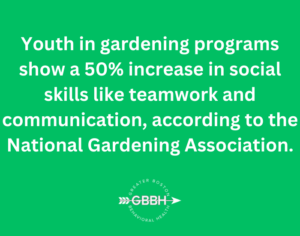In recent years, a growing body of research has highlighted the positive effects of plants on mental health and productivity. At Greater Boston Behavioral Health, we recognize the importance of a holistic approach to wellness, which includes not only traditional mental health treatment methods but also the incorporation of nature and greenery into our daily lives. This blog explores how plants can significantly enhance mental health, boost productivity, and support recovery through our various mental health treatment programs.
According to the National Institute of Mental Health (NIMH), approximately 1 in 5 adults (19.1%) in the U.S. experienced some form of mental illness in 2021, equating to over 51 million people. This includes conditions such as anxiety disorders, depression, and bipolar disorder, highlighting the widespread need for effective mental health support.
The Psychological Benefits of Plants
Reduction of Stress and Anxiety
Numerous studies indicate that exposure to plants can lower cortisol levels, the hormone associated with stress. A study published in the Journal of Physiological Anthropology found that participants who engaged in gardening or interacting with plants experienced significantly lower levels of stress and anxiety compared to those who did not. The act of caring for plants, whether watering, pruning, or simply observing their growth, can induce feelings of calm and relaxation. For individuals in our Intensive Outpatient Program and Partial Hospitalization Program, integrating plant care into their routines can serve as a grounding practice, providing a sense of purpose and connection to the natural world.
Improved Mood
Interacting with plants has been linked to enhanced mood and emotional well-being. Research from the University of Queensland found that participants who worked in environments enriched with greenery reported higher levels of happiness and life satisfaction. This positive impact on mood can be especially beneficial for those undergoing Cognitive Behavioral Therapy (CBT) or Dialectical Behavior Therapy (DBT), as it reinforces therapeutic gains by promoting a more positive emotional state. Engaging with plants can also serve as a distraction from negative thoughts and feelings, allowing individuals to focus on the present moment.
Enhanced Cognitive Function
Exposure to plants can improve focus and concentration. Studies have shown that natural elements in the workspace, such as potted plants or outdoor views, can enhance cognitive function, leading to increased productivity. A research study conducted by the University of Michigan found that participants performed 20% better on attention-related tasks after spending time in natural environments. This is particularly relevant for clients participating in our Outpatient Mental Health Treatment or any Mental Health Treatment Programs, as improved concentration can facilitate engagement in therapeutic activities and enhance learning.
Increased Creativity
Plants can also foster creativity, which is vital in therapeutic settings. Research from the University of Exeter found that individuals working in environments with greenery reported higher levels of creativity. This can be particularly useful in our Group Therapy Program, where creative expression can be a key component of healing. By encouraging artistic and innovative thinking, plants help create a stimulating environment conducive to personal growth and self-discovery.
Plants in the Workplace and Home
Creating an environment enriched with plants can be as simple as placing a few pots in your living space or office. Here are some suggestions for integrating plants into your daily life:
- Desk Plants: Small plants like succulents or snake plants are low-maintenance and can thrive indoors, providing a touch of nature to your workspace. These plants not only improve air quality but also create a visually appealing environment, which can uplift mood and inspire productivity.
- Herb Gardens: Growing herbs like basil, mint, or rosemary can add greenery and serve practical purposes in cooking, enhancing both your environment and daily routine. Tending to an herb garden can also provide a sensory experience that further connects you to nature.
- Indoor Trees: Larger plants such as fiddle leaf figs or rubber plants can make a bold statement while purifying the air, promoting both aesthetics and health. Incorporating these plants into your home or office can transform the atmosphere, making it feel more inviting and alive.
- Nature-Inspired Décor: If you can’t bring live plants into your space, consider incorporating nature-inspired art or photographs that feature greenery or landscapes. This can still provide some of the psychological benefits associated with being in nature.
The Social Benefits of Plants
Fostering Connection
Engaging with plants can create opportunities for social interaction. Community gardening, for example, encourages individuals to work together, share responsibilities, and connect over a common goal. This social engagement can alleviate feelings of isolation and loneliness, which are often prevalent in individuals facing mental health challenges.
Enhancing Family Dynamics
For families dealing with mental health issues, gardening can be a therapeutic activity that strengthens bonds. Planting and nurturing a garden together encourages teamwork and communication, providing a shared experience that promotes understanding and support. Our Family Therapy Program can integrate such activities to enhance family relationships and facilitate healing.
Building Supportive Communities
Involvement in gardening or plant care can lead to the formation of supportive communities. Joining local gardening clubs or participating in community gardens allows individuals to meet others with similar interests, fostering friendships and social support networks that are vital for mental health recovery.
Research from the National Gardening Association indicates that youth participating in gardening programs show a 50% improvement in social skills, including teamwork and communication. These programs provide opportunities for young people to collaborate, fostering important life skills that extend beyond the garden.
Integration into Mental Health Treatment
At Greater Boston Behavioral Health, we understand that mental health is influenced by various factors, including the environment. Our Mental Health Treatment Center in Massachusetts embraces a holistic approach by integrating elements of nature into our treatment programs:
- Group Therapy Program: Sessions may incorporate nature walks or discussions about personal gardening experiences, allowing clients to connect with each other and nature simultaneously. This can foster a sense of community and shared experience, enhancing the therapeutic process.
- Family Therapy Program: Engaging families in activities such as planting a garden together can foster teamwork, communication, and healing. Gardening as a family can strengthen bonds, teach responsibility, and provide a sense of accomplishment.
- Therapeutic Practices: Techniques in our Mental Health Therapy Programs may include mindfulness practices centered around nature, such as guided imagery that incorporates natural settings. Visualization of serene landscapes can help clients reduce anxiety and cultivate a sense of peace.
- Workshops and Activities: We also offer workshops on plant care and gardening, encouraging clients to engage with nature in a hands-on way. These activities can serve as both therapeutic exercises and enjoyable hobbies, promoting relaxation and emotional expression.
- Nature-Based Activities: In addition to traditional therapy, our programs may include outdoor activities such as hiking, walking in parks, or participating in community gardening projects. These experiences not only connect clients with nature but also encourage physical activity, which is beneficial for mental health.
Tips for Incorporating Plants into Your Life
- Start Small: If you’re new to gardening, start with a few easy-to-care-for plants. Succulents, snake plants, and pothos are excellent choices for beginners.
- Create a Routine: Incorporate plant care into your daily or weekly routine. Regular watering and care can become a meditative practice, providing structure and mindfulness.
- Join a Gardening Group: Find local community gardening clubs or groups that align with your interests. This can help you connect with others who share your passion for plants and gardening.
- Bring Nature Indoors: Decorate your workspace or home with a variety of plants. This not only enhances aesthetics but also improves your environment’s overall health.
- Explore Nature: Spend time in nature by visiting parks, gardens, or natural reserves. Immersing yourself in natural settings can provide a sense of peace and rejuvenation.
Conclusion
The impact of plants on mental health and productivity is profound and multi-faceted. Incorporating plants into daily life can lead to reduced stress, improved mood, enhanced cognitive function, and increased creativity—all crucial for recovery and well-being. At Greater Boston Behavioral Health, we are committed to promoting holistic practices that enrich our clients’ lives. By understanding and utilizing the benefits of nature, we can create supportive environments that encourage healing and growth. Contact us today at (888)278-0716 to discover how our services can support you on your path to recovery!
FAQ on Impact of Plants on Mental Health and Productivity
How do plants impact mental health?
Plants can reduce stress and anxiety, improve mood, enhance cognitive function, and foster creativity, contributing to overall mental well-being.
Can having plants in my workspace boost productivity?
Yes! Research shows that plants can improve focus and concentration, leading to increased productivity in work and study environments.
What types of plants are best for improving mental health?
Low-maintenance plants like succulents, snake plants, and peace lilies are excellent choices. They not only enhance aesthetics but also improve air quality.
How can I incorporate plants into my mental health treatment?
Engaging in plant care can be part of your daily routine, and therapeutic activities may include gardening, nature walks, or discussions about plants during therapy sessions.
Are there mental health programs that include nature-based therapies?
Yes, Greater Boston Behavioral Health offers various Mental Health Treatment Programs, including those that incorporate nature-based activities and therapeutic practices centered around plants.
What benefits can families gain from gardening together?
Gardening can strengthen family bonds, teach teamwork, and provide a shared, therapeutic experience that promotes communication and healing.


